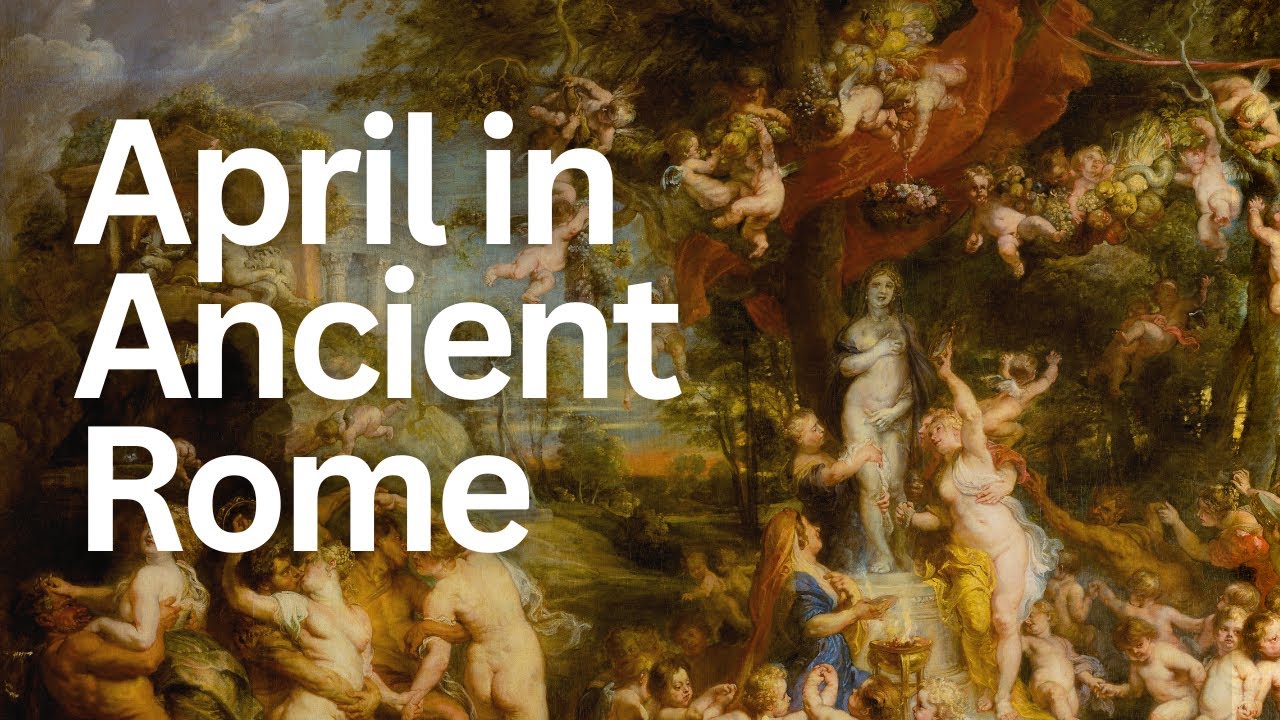Start with our video overview:
April was the fourth month of the Roman calendar. While the exact origin of its name is uncertain, it seems to be derived from the Latin word aperire, meaning “to open.” This refers to the blossoming of plants, as April occurs during springtime in Italy. As a result, the month was host to a number of festivals celebrating fertility and agriculture. However, the most important holiday in April was the anniversary of the founding of Rome by Romulus. This legendary event was said to have taken place on April 21, 753 BCE.
April 1, recurring: The Veneralia festival was held in honor of Venus Verticordia (Venus who can change hearts) and Fortuna Virilis (virile Fortuna).
April 4, 188 CE: Caracalla is born. He would serve as Roman emperor from 198-217 CE.
April 4-10, recurring: The Ludi Megalenses were held at the Circus Maximus in Rome. These games were held in honor of Magna Mater, an Anatolian goddess imported to Rome during the Second Punic War.
April 5, recurring: The festival of Fortuna Publica (public fortune) was held. It was associated with fertility and luck.
April 8, 217 CE: Caracalla is assassinated.
April 11, 145 CE: Septimius Severus is born. He would serve as Roman emperor from 193-211 CE.
April 12-18, recurring: The Cerealia festival, accompanied by the Ludi Cereales, was held in Rome. It was dedicated to Ceres, goddess of agriculture.
April 16, 73 CE: The fortress of Masada in Judea (modern-day Israel) falls to the Roman army, ending the First Jewish-Roman War.
April 21, 753 BCE: This is the date most commonly given for the founding of Rome by Romulus.
April 21, recurring: The Parilia festival was held in honor of Pales, a goddess associated with sheep.
April 23, recurring: The Vinalia Urbana festival was held to celebrate the harvesting of wine. It was dedicated to Venus and Jupiter, who were thought to play a role in viticulture.
April 25, recurring: The Robigalia festival was held to ward off agricultural pestilence. It protected against Robigus, the divine personification of blight.
April 26, 121 CE: Marcus Aurelius, future emperor and philosopher, is born. He served as Roman emperor from 161-180 CE.
April 27/28, recurring: The Floralia was held to honor Flora, goddess of flowers. It was accompanied by six days of games, the Ludi Florae.
April 30, 311 CE: The Great Persecution, started by Diocletian in 303 CE in an attempt to eradicate Christianity, officially ends.
Bibliography:
- Corner, Sean. (2010). “Wine.” In The Oxford Encyclopedia of Ancient Greece and Rome (1st ed.).
- Ganiban, Randall T. (2010). “Jupiter.” In The Oxford Encyclopedia of Ancient Greece and Rome (1st ed.).
- Ganiban, Randall T. (2010). “Venus.” In The Oxford Encyclopedia of Ancient Greece and Rome (1st ed.).
- Grout, James. “Vinalia.” University of Chicago. https://penelope.uchicago.edu/~grout/encyclopaedia_romana/calendar/vinalia.html
- Liberman, Anatoly. (2012). “Two English apr-words, Part 1: April.” Oxford University Press Blog. https://blog.oup.com/2012/08/word-origin-april-etymology/
- Miller, John F. (2010). “Festivals, Roman.” In The Oxford Encyclopedia of Ancient Greece and Rome (1st ed.).
- Mueller, Hans-Friedrich. (2010). “Ceres.” In The Oxford Encyclopedia of Ancient Greece and Rome (1st ed.).
This content is brought to you by The American Institute for Roman Culture, a 501(C)3 US Non-Profit Organization.
Please support our mission to aid learning and understanding of ancient Rome through free-to-access content by donating today.
Cite This Page
Cite this page as: “Darius Arya, The American Institute for Roman Culture, “April in Ancient Rome” Ancient Rome Live. Last modified 07/27/2024. https://ancientromelive.org/april-in-ancient-rome/
License
Created by The American Institute of Roman Culture, published on 07/27/2024 under the following license: Creative Commons: Attribution-NonCommercial-ShareAlike. This license lets others remix, tweak, and build upon this content non-commercially, as long as they credit the author and license their new creations under the identical terms. Please note that content linked from this page may have different licensing terms.


